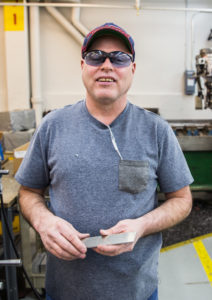Mike King
Triumphant
By Linda Norlen

Mike King was 19 years old when he was diagnosed with Retinitis Pigmentosa (RP), a degenerative disease of the retina. The doctors could not predict how fast the disease would progress, Mike only knew that his eyesight would worsen over time. Mike was living in Cheyenne, Wyoming working different jobs when the state revoked his driver’s license at age 28, limiting him greatly. Aware of their son’s condition, Mike’s parents who were residing in Seattle learned about the Lighthouse and decided to take a tour of the organization. Mike’s dad was so impressed, he ended up taking a second tour before convincing Mike to come to the Lighthouse in Seattle.
Mike started at the Lighthouse in 1991 when he was 29. At the time, it was defined more as a training facility. Mike thought he might train here for six or seven months and then find a job somewhere else. Instead, he was excited to find himself gainfully employed in the machine shop here making parts for The Boeing Company.
Since Mike still had his eyesight when he started at the Lighthouse, he was able to observe his fellow employees who were blind, taking note of how they worked and got around. Mike gradually lost his sight to RP over a period of years and it was very hard to deal with this. A friend of Mike tried to warn him that he should start practicing his cane skills, but Mike did not want to listen. His eyesight finally failed him at age 46, but thankfully Mike had a lot of people here who wanted to help him transition into this new period of his life.
Dealing with blindness has not always come easy to Mike, he went through various emotional stages before becoming the man he is today. At first, Mike was depressed and felt that he was not capable of doing anything correctly. This feeling of inadequacy led Mike to feel angry at his situation. Not knowing how to handle all of these emotions, Mike would occasionally lash out at his wife and daughter, who were also trying to adjust to Mike’s new reality. However, with time Mike was able to overcome these obstacles. Mike said that getting a guide dog and being reintroduced to sports positively attributed to his new outlook on life.
See more of Mike’s story in this Lighthouse video, Making an Impact (2017)
It was Mike’s coworker Telea Noriega (who now lives out of state) who invited Mike to join a sports team nine years ago. Because Mike grew up playing sports, being introduced to the blind sports of goalball and beep baseball gave him a big boost in morale. Goalball, a winter sport played indoors on a volleyball court with three players on a side, is a mixture of dodge ball and soccer; players roll a hard rubber ball with bells on the ground to make a goal. Five years ago, Lighthouse employees also started a beep baseball team, the South King Sluggers. This version of baseball, with 6 players to a side, starts annually in the spring. Batters swing at a beeping ball; first and third base also produce sounds; the goal is to get on base before the outfielders catch the ball. Lighthouse employee Kevin Daniel, the beep baseball coach, enters the team in tournaments, some of which are fundraisers against sighted players wearing blindfolds. The Sluggers have played the Seattle Police Department team and have traveled to games in Eastern Washington, Florida, and even Canada for the beep baseball world series. Mike says beep baseball is a “young man’s sport,” and the team is actively recruiting younger players, but he still enjoys playing it.
At the age of 56, Mike’s current position is CNC Specialist on an Okuma router, a job he assumed less than a year ago. In his 27-years here, he has worked the gamut of jobs in aerospace. He was once a production lead for over ten years, but decided to go back to machining after he had totally lost his sight.
He is still learning braille, but it’s hard to learn when you’re older, he says. He has taken classes and will continue to do so. He told his teacher she was wasting her time, but she refused to let him quit. “You can read the number on your motel room, can’t you?” she said, “so you must be learning.”
When Mike’s daughter, now a nursing student at Washington State University, comes to visit the Lighthouse, she is amazed to see what those who are blind can do. Mike still remembers an essay she wrote in high school about how she was influenced by his ability to overcome hurdles and cope with his blindness.
Mike says that Paul Fletcher is a role model for him, because he is always encouraging, always positive. Emil Dupuy, a former Vice President, was also a good role model. Mike Scheschy, Mike’s current supervisor who came to the Lighthouse just six months before he did, worked hard to become a supervisor and was the one who encouraged Mike to apply for a lead position.
Mike appreciates that the stress level on the job is low here and he finds the people to be amazing. He feels that “too much negativity brings people down.” When he was a lead and every employee was expected to have a goal, he would never “shoot down” the goal of anyone, he says. Sometimes the goal wasn’t totally feasible, for safety reasons, but he would try to find some way to help employees reach their aspirations.